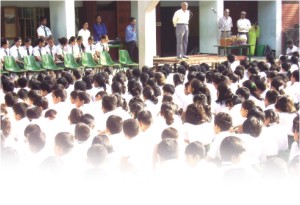Feature

Syed Badrul Ahsan
 There are always the roots that clutch. That was what TS Eliot said once. Even if he hadn't, we would have known anyway. There is in us forever a yearning for the past, or that part of it we once attached to ourselves. On a morning in the week gone by, it was the past which caught up with me, or it was I who raced back in time to seize a part of history that has always been mine. I speak today of Greenherald School, the place where I first understood the liberating effect of teaching. It was at Greenherald, twenty seven years ago, that I decided that nothing in life could be nobler than teaching children. The children were babies, or nearly. And I, in the manner of so many men and women of my generation, was young and idealistic, convinced that it was in a classroom full of little girls and boys that poetry could be shaped and ambitions refined. It felt good to be pedantic. There are always the roots that clutch. That was what TS Eliot said once. Even if he hadn't, we would have known anyway. There is in us forever a yearning for the past, or that part of it we once attached to ourselves. On a morning in the week gone by, it was the past which caught up with me, or it was I who raced back in time to seize a part of history that has always been mine. I speak today of Greenherald School, the place where I first understood the liberating effect of teaching. It was at Greenherald, twenty seven years ago, that I decided that nothing in life could be nobler than teaching children. The children were babies, or nearly. And I, in the manner of so many men and women of my generation, was young and idealistic, convinced that it was in a classroom full of little girls and boys that poetry could be shaped and ambitions refined. It felt good to be pedantic.
On Sunday morning, years after I had first stepped into a room brimming over with children of various nationalities and sensibilities, I stood talking to another and larger group of children about the history of my country, of their country. It was as a teacher that I chose to share my thoughts with them. That is how I did it. Not as a journalist, not as a one-time government official, but as a being who has always been entranced by the idea of teaching. In the old days, it was a different world. The children I taught were all my children, in that philosophical sense of the meaning. On Sunday, I thought, even as I spoke to that new generation of children, that I was before souls towards whom the paternal flowed from me. They listened to me, intently even as the heat of the sun threatened to sear them, to make them wish they did not have to be there listening to tales retrieved from the pages of history. They sat on an entirety of a basketball court, the same that was being given form back when my friends and I taught in a building that was being fashioned into a school brick by brick and idea upon idea. As I spoke, I wondered if I should have remained a teacher there, or anywhere. For I have missed the teaching I have done at Greenherald, at all the other schools I was employed in over a long stretch of years. At Scholastica, I discovered newer expanses of experience. At Radiant, I let the young know, or so I would like to think, how it felt to traverse a world of politics. And at Notre Dame College, where I finished my higher secondary examinations in 1975, teaching was a hugely exciting affair.
On Sunday, some of my friends, those who joined the Greenherald teaching staff before and after me, gave me company. Sabir Hussain, always the man with a poetic turn of mind, spoke of verses, of the horrors he witnessed in March 1971. Masudul Gani, that unchallenged authority in mathematics, dwelt eloquently on the history of the freedom struggle as it really was before the forces of darkness went into a mutilation of it. And then Sister Asha and Sister Michelle threw in the many dimensions of their own stories, tales which will surely have left those children sizzling in the sun enlightened on the political traditions they are today heir to. And with them, right there, was Timir Nandy, the man who taught them music, the man who as a brave youth had gone off to be part of the struggle that would free the land of predators and had come back home in triumph. These were the stories we related to the children of Greenherald in the gathering brilliance of the morning. We spoke to them of the ecstasy we felt rushing through us when we won the elections of December 1970. We remembered the revolutionary times when we sang all the songs that would send us down freedom road. We recalled, on that morning of a new 25 March, thirty-seven years after an earlier 25 March the Pakistan army had torched through the thousands of Bengalis it killed in this city and elsewhere, the horrors our generation and the generation of our fathers lived through. The children listened. Some took notes. Under the skies of a gleaming day, all of us --- teachers, former teachers and students alike --- trekked back into the tortuous paths of history.
It was the old cause we went back to. It was an old school to which I returned. On my way out, as I said hello to Sister Barbara, it was a lost twilight I recreated in the cluttered regions of the imagination. The past, as they say, is another country. And the present is generally a prosaic affair.
|
